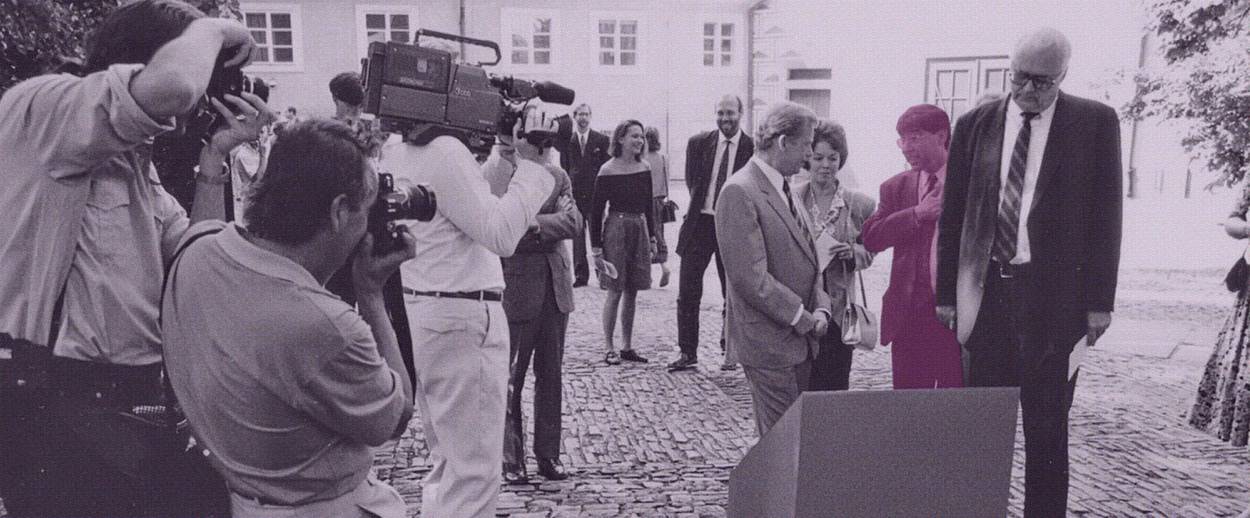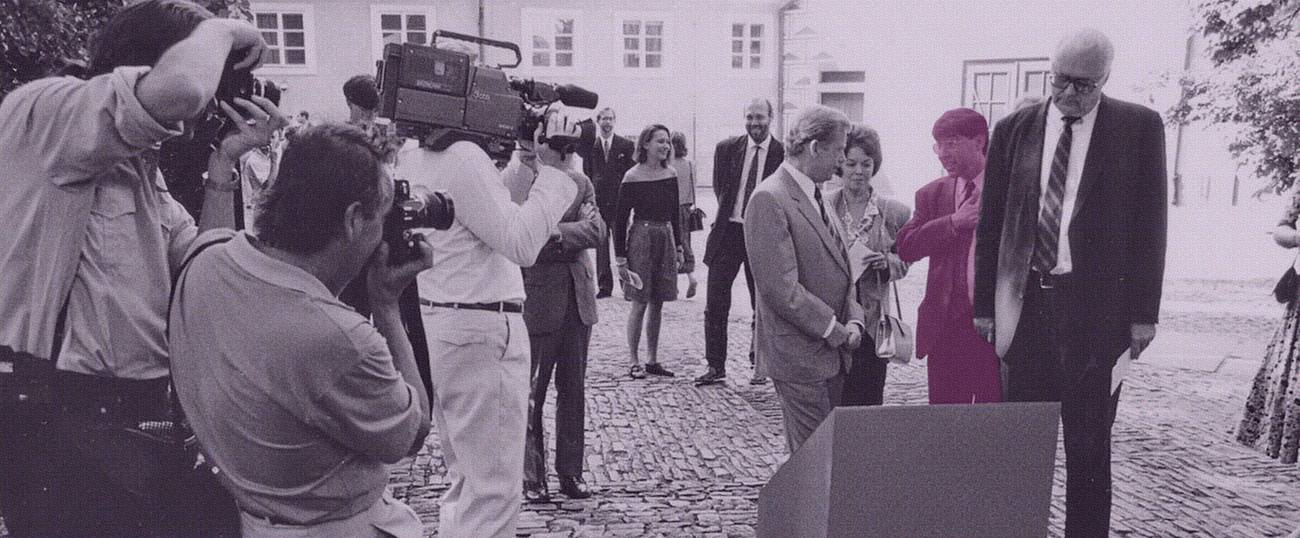David Shapiro’s Narrow Bridge
A descendant of the New York School brings cantorial poetics to his new collection, ‘In Memory of an Angel’




“The whole world is a very narrow bridge … gesher tzar me’od,” whispered David Shapiro, without a hint of irony—near-whispered it, cradling the fragile melody, nearly drowned out by the sounds of the top-hits radio station blaring in a hotel lobby, where we sat, enveloped by a darkening San Francisco. On another occasion, I’d burst out laughing or even cringe thinking of this tune, worn down by endless summer-camp invocations, but David Shapiro—influential American poet and critic—in that one moment, stripped the song of clichés, his voice flickering, hands trembling and gesturing, as he bridged seemingly disparate worlds of ancient traditions, family ties, poetic experiments, great minds, and long-gone friends.
Shapiro’s poetic career launched incredibly early: His first collection of poems, January, came out when he was still a teenager. He was lauded and embraced by veritable poetry legends—Kenneth Koch and Frank O’Hara, both associated with New York School of poetry. More than a half-century later, Shapiro’s aesthetics remain, largely, aligned with those of the New York School. He still lives in his home in the Riverdale neighborhood of the Bronx. I caught up with him recently during Shapiro’s rare West Coast visit, occasioned by the publication of his newest poetry collection, In Memory of an Angel.
A few days prior to our meeting, City Lights Bookstore in San Francisco’s North Beach hosted a celebratory reading. The legendary store’s top floor, where the readings are typically held, filled up with Shapiro’s friends and admirers—with many recognizable Bay Area poets in attendance. Notably, Joseph Lease—at one time Shapiro’s student, now an accomplished poet in his own right—opened the reading with a few poems of his own.
Readings have their rituals; it is taken for granted, for instance, that poets stick to the words on the pages in front of them, avoid interruptions, and keep the space between poems to a minimum. Shapiro did not only defy these expectations, he thrived on such defiance, as he inserted spontaneous commentary, anecdotes, and loosely related quotes between the poems, and even in the interstices between the lines, as he interrupted himself mid-poem. It was as if he was his own spontaneous commentator, a man possessed with poems that were alive as they continued sprawling with interpretive afterlife.
As it turned out, hermeneutics exerted a formidable influence on Shapiro, who, as he told me, is very fond of Rashi, the 11th-century scholar, most famous for his commentaries on the Hebrew Bible and the Talmud. The poet praised the compactness of the interpreter’s style, reminiscing about Rashi’s comment on the second verse of the Torah. The words “tohu va-vohu”, or the primeval void, according to Rashi, signify a sense of “astonishment”—a word Shapiro uttered in revelatory, incantatory whisper. It may be that this sense of eloquent astonishment in the face of chaos speaks to Shapiro because it is a feeling shared by poets and mystics alike—a feeling that is as mythic as it is liturgical.
“I was born around blessings and liturgical music of [my grandfather] Berele Chagy,” Shapiro told me. In the heyday of cantorial music (1910-40), Chagy was among the most sought out golden-voiced chazzanim; within the circles of contemporary aficionados, he is still studied, imitated, and held in high esteem, as musician Jeremiah Lockwood explained to me. Particularly memorable is Chagy’s trademark falsetto, which is surprisingly expansive, lyrical, and fragile. “There are parts of me that have come out of the sanctity of Jewish liturgy,” added Shapiro. “This is strange because most of my generation was extremely, extremely secular. In my work, you see this other force, a field of force.”
In The Dead Will Not Praise You, a poem dedicated to his grandfather, Shapiro writes:
My grandfather emerges
in a synagogue
with familiar accents
unlike his noble voice
a pudgy little man
sweet tenor coloratura flautando
He marches down the aisle
with a blue white crown
Women ask questions
and they are charmed
and he is beloved
like etymology
Is my mother in attendance
or is she dead?
What are questions now?
Are the dead permitted to
sing? Is he serious?
Are the dead permitted
to return and sing?
The poem’s title is a quotation from Isaiah 38:18—and a line that resurfaces in Jewish liturgy. As the poem unfolds, the title’s certitude morphs into a question. If the poem’s opening lines are narrative-like, recounting what seems to be a vision, or a dream, it is toward its end that the poem spins out of control, toward questions, answered in turn by other questions.
The poem’s fulcrum is the mysterious, gorgeous phrase “beloved like etymology.” Etymology, the study of words’ origins, is surely loved by poets, who have always had their sights set on the origins of human consciousness and its relationship with language. Yet, it is perhaps in the invocation of cantors, chazzanim, who, as they chant and repeat words, mantra-like, in different pitches and iterations, that words’ primordial plea is revealed.
“What are questions now?” asks the poet of his dead grandfather. What is there left to ask, now, once you are among the departed? Do questions like these ever get answered? The other-worldliness of Chagy’s famed falsetto permeates this poem as if to imply: There’s always more, in this world and the next.
It was as if Shapiro was his own spontaneous commentator, a man possessed with poems that were alive as they continued sprawling with interpretive afterlife.
Nearly two decades ago, Shapiro collaborated on Body of Prayer—a poetic and theological dialogue, which he conducted with Israeli architect-novelist Michal Govrin and French philosopher Jacques Derrida. In this work, Derrida replies to a number of Shapiro’s poems, including the one above, and points out that “there is something trembling, some tremor within a prayer. There is no quiet prayer. Because there is an anxiety about authenticity of the prayer. And I am not the one who can decide about the authenticity of the prayer. Only the other one can decide. And the other one is just a question mark.” The question marks, Derrida seems to imply, are where Shapiro’s poem becomes most prayer-like. After all, whom is he asking these questions of? Who, if anyone, can answer them? Through this barrage of questions, the narrator is no longer listening to his grandfather but constructs an anxious prayer of his own.
In this rare meditation on Jewish prayer, Derrida goes on to point out: “The possibility that God remains eternally absent, that there might be no addressee at the other end of my prayer is the condition of the prayer.” In other words, Derrida seems to imply, Shapiro’s vision is all the more real because it is fraught and motivated by prayer’s precondition: self-doubt. The fact that it advances, despite that self-doubt, is perhaps the greatest astonishment of all.
Shapiro’s humor is the other side of this astonishment. Ironically reflecting on his influences in A Poem I Didn’t Write or Pessoa’s Typewriter, the poet claims: “Finally I admit it. I wrote nothing,” and goes on to attribute his poems to dreams, Kenneth Koch, Anton Chekhov, Allen Ginsberg, Proust, Kafka, various painters, his son, even his college roommate, finally quipping: “Even my dear Silence was/plagiarized from a true composer.” And though on a literal level Shapiro is probably alluding to composer John Cage, at the same time, the poem’s irony thrives on the notion that silence can be plagiarized.
As we chatted in the hotel lobby, Shapiro recalled that his mentor Koch “had a special tendency toward wit and humor, and … believed in the great Jewish jokers. He spoke of Jesus as one such joker.” Shapiro also recalled the sort of humor that marked the Surrealist tradition, quoting Paul Eluard’s memorable aphorism “Elephants are contagious.”
Indeed, Shapiro’s own humor is often dark and surreal, as in Lag Solo, another notable poem in the new collection:
There’s a sign on my basement: Private Road.
There’s a sign on garage: Self-Closing Door.
Between the two, we don’t exactly live
exactly die.
In our pocket, dust and ashes; in the other,
pocket, images.
We wear out.
And on the gifted machine: a dance-mix.
Or the shadow of a dance-mix:
Dance, She Cried.
Here, pedestrian, suburban phrases like “Private Road” and “Self-Closing Door” take on ominous, existential overtones. The middle of the poem is undoubtedly a riff on the famous statement attributed to Rabbi Simcha Bunim of Peshischa. As the saying goes, one should always carry in one’s pockets two notes: one, a reminder that we’re but dust and ashes, and the other, an affirmation that the world was created for one’s own sake. Shapiro subverts the Hasidic teaching in a curious way. First, in his version, it is not a mere reminder about the dust and ashes—but the actual dust and ashes that we’re carrying. Moreover, he is substituting a creation story’s claim of human superiority (“the world was created for my sake”) with a single word, “images.” Without belief, all we have is images—not a great alternative to the morbid content of the other pocket! Or is Shapiro suggesting that the ability to perceive images, and translate them into poetry, is what makes us—alive?
We kept the conversation short. As Shapiro confided: “It’s been a hard time for me recently—I lost a part of my neural physiology because of something called Parkinson’s disease. It is strange and may be cured one day, but right now I’ve had to really be tough about surviving. Meyer Schapiro [an art historian] said: ‘We Jews are open to the fury of history.’ ”
When Shapiro finished his reading at City Lights, it seemed the applause would never end—it went on and on, ebbing and rising again. The thought of that applause, and of that gratitude, echoed within me as our own conversation came to a close. I was reminded of Shapiro’s For the Jewish Objectivists, a liturgical poem of gratitude—for the good, the dark, the surreal, the liminal, and all the rest:
Seeds or snow
Not everyone can tell
There is a blessing for being blessed
And a blessing for catastrophe
But is there a blessing
For a house split open by
Seed of snow
So that everyone sees through you
As if you were a grey door
***
Read more of Jake Marmer’s Tablet magazine essays on poetry here.
Jake Marmer is Tablet’s poetry critic. He is the author of Cosmic Diaspora (2020), The Neighbor Out of Sound (2018) and Jazz Talmud (2012). He has also released two jazz-klezmer-poetry records: Purple Tentacles of Thought and Desire (2020, with Cosmic Diaspora Trio), and Hermeneutic Stomp (2013).